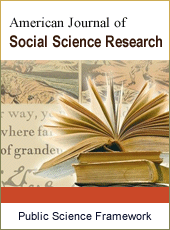American Journal of Social Science Research
Articles Information
American Journal of Social Science Research, Vol.1, No.1, Apr. 2015, Pub. Date: Mar. 26, 2015
Rehearsals of Revolution: Perspective on Osofisan’s Marxian Revolutionary Philosophy and Revolutionary Aestheticism in Morountodun and The Chattering and the Song
Pages: 9-15 Views: 8786 Downloads: 2297
[01]
Samuel O. Chukwu-Okoronkwo, Department of Mass Communication, Abia State University, Uturu, Nigeria.
Femi Osofisan ranks among the foremost contemporary Nigerian dramatists. He is a prolific and radical writer who addresses himself to the socio-political problems in contemporary Nigerian society. The interest to undertake a Marxian perspective on Osofisan is predicated by the Marxist influence which informs most of his works. This is an influence which places Marxism as the ideology of the proletariat … a formidable weapon in the struggle for social progress and the world’s reconstruction along new and just lines [1]. The Marxian philosophy, therefore, is a revolutionary philosophy which places the destiny of the proletariats in their own hands. Osofisan’s dramas underscore the utility of art as agency for conscientisation and social mobilisation. Through these works he evinces his belief in the power of literature/theatre to enlighten and spur the masses to take decisive actions in combating and changing a plaguing and oppressive system which does not favour them. Morountodun and The Chattering and the Song, therefore, encapsulate this belief. The paper presents them, however, as Osofisan’s rehearsals of revolution, and highlights their strengths and revolutionary aestheticism.
Aestheticism, Art, Functionality, Marxian Philosophy, Rehearsal, Revolution
[01]
Marx, K. and Engels, F. (1970). Marx and Engels: Selected Works. Moscow: Progress Publishers.
[02]
Onyekaba, C. E. (2008). “Dramatic Conflict and Social Realities in the Modern Nigerian Drama: A Study of selected Nigerian Plays and Video Films”. Doctoral Dissertation [in Progress], University of Lagos.
[03]
Eagleton, T. (1976). Marxism and Literary Criticism. London: Methuen and Co. Ltd.
[04]
Nwabueze, E. P. (1988). “The Playwright as Vigilante: Form and Meaning in Femi Osofisan’s The Chattering and the Song”. Nsukka Journal of the Humanities, 3/4.
[05]
Osofisan, F. (2001). Literature and the Pressure of Freedom: Essays, Speeches and Songs. Ibadan: Opon Ifa Readers.
[06]
Bukharin, N. (1974). “What is Arts”. In Maynard Solomon [ed.] Marxism and Art. New York: Vintage Books.
[07]
Lukin, Yu A. (1980). “Ideology and Art”. In Angus Roxbough [ed.] Marxist – Lennist Aesthetics and the Arts. Moscow: Progress Publishers: 103-115.
[08]
Dunton, C. (1992). Make Man Talk True: Nigerian Drama in English Since 1970. London: Hanz Zell Publishers.
[09]
Osofisan, F. (1982). Morountodun and Other Plays. Ikeja: Longman Nigeria Limited.
[10]
Osofisan, F. (1977). The Chattering and the Song. Ibadan: University Press.
[11]
Yerima, A. (2008). “The Women as Characters in Nigerian Drama: A Discourse of Gender and Culture. In Duro Oni and Ahmed Yerima [eds.] Trends in the Theory and Practice of Theatre in Nigeria. Lagos: Society of Nigerian Theatre Artists [SONTA]: 59 – 75.
[12]
Udenta, U. O. (1993). Revolutionary Aesthetics and the African Literary Process. Enugu: Fourth Dimension Publishing Co. Ltd.
[13]
Obadiegwu, C. C. (1992). “Drama, War and Society”. M. A. Thesis, Ahmadu Bello University, Zaria, Nigeria.
[14]
Enekwe O. O. (1980). Interview with Femi Osofisan. The Greenfield Review. New York: 76 – 80.
[15]
Olaogun, M. O. (1988). “Parables in the Theatre: A Brief Study of Femi Osofisan’s Plays”. Okike (An African Journal of New Writings) 27/28 March: 43 – 55.
[16]
Umukoro, S. O. (1994). Drama and Politics in Nigeria. Ibadan: Kraft Books Ltd.
[17]
Etherthon, M. (1982). The Development of African Drama. London: Hutchinson and Co. (Publishers) Ltd.
[18]
Onyekuba, O. (1995). “Developing New Forms in Nigerian Theatre: Femi Osofisan’s Experiment in Morountodun”. Paper Presented at the 11th Annual Convention and 13th Anniversary of the Society of Nigerian Theatre Artists (SONTA), held at University of Benin from 20th – 24th June.
[19]
Boal, A. (2000). Theatre of the Oppressed. [trans.] Charles A., Maria-Odilia Leal McBride and Emily Fryer. London: Pluto Press.

ISSN Print: 2381-7712
ISSN Online: 2381-7720
Current Issue:
Vol. 7, Issue 3, September Submit a Manuscript Join Editorial Board Join Reviewer Team
ISSN Online: 2381-7720
Current Issue:
Vol. 7, Issue 3, September Submit a Manuscript Join Editorial Board Join Reviewer Team
| About This Journal |
| All Issues |
| Open Access |
| Indexing |
| Payment Information |
| Author Guidelines |
| Review Process |
| Publication Ethics |
| Editorial Board |
| Peer Reviewers |


